
Virtual Hosting vs Dedicated Hosting: Which is Better for Your Business?
Both Virtual hosting and Dedicated Hosting are very reliable options; however, they differ in many ways.
So, what option would you go for?
Choosing the best preferred hosting option for your business is not as simple as it seems. It can have a great impact towards your business in regards to performance, user experience, website uptime and scalability for growth.
It makes it possible to effectively control the costs while meeting the necessary technological and security requirements. This decision is capable of boosting the trust of your consumers and thus boost their satisfaction and growth of your business.
Still having difficulty in making The Preferred Choice?
Let’s take a look at pros and cons of each to help you choose one that fits your business needs. Based on the scalability, performance, or cost- effectiveness of your business, knowing these hosting options will have a vital impact on your success.
What is Virtual Hosting?

Virtual hosting, sometimes just referred to as virtual machines, relies on a network of virtual servers on the cloud to host your website or application.
Instead of storing your data on a single physical server, Virtual hosting disperses it across multiple interconnected servers. This offers flexibility, scalability, and robust uptime guarantees.
In most cases, Virtual hosting can be purchased using a pay-as-you-go model from a cloud service provider such as Angani. This means you only pay for what you use and don’t have to worry about overprovisioning or under-provisioning resources.
Pros of Virtual Hosting
- Scalability: You easily scale resources up or down depending on traffic. For instance, an e-commerce store running a Black Friday sale can instantly handle sudden traffic surges.
- Cost-Effectiveness: The Pay-as-you-go pricing eliminates the need for upfront investments, making it an excellent choice for startups.
- High Availability: The abundance of redundant servers ensures minimal business downtime. Even if one server fails, others in the network maintain functionality.
- Global Reach: Accessibility to data quickly from anywhere with geographically dispersed servers, hence enhancing user experience for global audiences.
- Security: Availability of advanced encryption and disaster recovery solutions protects your data, ensuring compliance with data privacy regulations.
Cons of Virtual Hosting
- Variable Costs: Usage-based billing can lead to unpredictable monthly fees, especially during high-demand periods.
- Shared Environment: Resources are shared, which could pose minor performance lags during peak usage.
- Complexity: Requires technical expertise to manage configurations and optimize performance.
- Dependency on Internet Connectivity: Virtual hosting relies heavily on a stable internet connection. If your business or your customers have unreliable internet, it can hinder performance and access to hosted services.
- Downtime Due to Provider Issues: While Virtual hosting offers redundancy, if your cloud provider faces technical difficulties, it can result in widespread downtime, affecting your website’s availability.
What is Dedicated Hosting?

Dedicated hosting is a cloud hosting service that provides a physical server or servers exclusively to a single business customer.
This gives you full control over the hardware, software, and configurations, making it ideal for resource-intensive websites or applications. It is useful for websites and applications that require high levels of customization, control, or compute-intensive workloads.
Pros of Dedicated Hosting
- Performance: Provides exclusive access to server resources ensuring fast load times and optimal performance, essential for high-traffic websites.
- Customization: Full control over server configurations allows for tailored setups, such as custom operating systems or software.
- Security: Dedicated resources reduce vulnerabilities associated with shared environments, making it suitable for sensitive industries like healthcare.
- Reliability: Consistent performance regardless of traffic levels ensures seamless user experience.
- Reliable Uptime: Since you’re not sharing server resources with other users, dedicated hosting ensures consistent uptime and better performance for your website or application.
Cons of Dedicated Hosting
- Higher Costs: Requires significant upfront investment and maintenance fees, which may be prohibitive for small businesses.
- Limited Scalability: Scaling resources often involves downtime and additional expenses for hardware upgrades.
- Maintenance Responsibility: Clients are responsible for server upkeep, requiring technical expertise or dedicated IT staff.
- Longer Setup Times: Setting up a dedicated server is often time-consuming, requiring server deployment and configurations, unlike Virtual hosting, which can be set up almost immediately.
- Resource Underutilization: If your business doesn’t consistently need all of the server’s resources, you may end up paying for unused capacity, leading to wasted costs.
Key Differences: Virtual Hosting vs Dedicated Hosting
- Scalability:
- Cost:
- Performance:
- Security:
- Flexibility and Management:
Virtual hosting: Offers unparalleled scalability. If your traffic spikes unexpectedly, you can increase resources instantly.
Dedicated Hosting: Limited scalability as you’re constrained by the physical server’s capacity. Adding resources requires manual upgrades and additional expenses for hardware upgrades.
Virtual hosting: Flexible, pay-as-you-go pricing model suits businesses with fluctuating demands. For example, seasonal businesses benefit from cost savings during off-peak periods.
Dedicated Hosting: Fixed, high costs make it better for organizations with steady traffic and predictable needs.
Virtual hosting: Performance can vary slightly in shared environments but excels with load balancing and advanced caching mechanisms.
Dedicated Hosting: Guaranteed high performance due to exclusive access to server resources. This makes it ideal for applications requiring real-time processing.
Virtual hosting: Advanced security measures but risks from shared environments and data breaches. Providers offer tools like multi-factor authentication and intrusion detection.
Dedicated Hosting: Higher level of control ensures robust security for sensitive data. For instance, financial institutions often prefer dedicated hosting.
Virtual hosting: Requires less direct management, as providers often handle updates and maintenance. Ideal for businesses lacking in-house IT expertise.
Dedicated Hosting: Demands significant involvement in maintenance and technical oversight, offering flexibility to customize every aspect.
When to Choose Each Option?
For Virtual Hosting, Ideal Cases Are:
- E-commerce Stores: High variability in traffic during sales events like Cyber Monday.
- Startups and Small Businesses: Limited budgets and dynamic growth needs make Virtual hosting an economical choice.
- Global Applications: Users spread across different geographical locations benefit from fast load times due to content delivery networks.
For Dedicated Hosting, Ideal Cases Are:
- Enterprise Applications: High-performance requirements and predictable traffic patterns demand dedicated resources.
- Regulated Industries: Industries like finance or healthcare requiring strict data control benefit from the enhanced security of dedicated hosting.
- Gaming Servers: Need for low latency and high performance makes dedicated servers the go-to option for online gaming platforms.
Pros and Cons Summary Table
| Feature | Virtual Hosting | Dedicated Hosting |
|---|---|---|
| Scalability | Highly scalable | Limited |
| Cost | Pay-as-you-go, cost-efficient | High upfront costs |
| Performance | Shared resources, load balancing | Dedicated, guaranteed speed |
| Security | Good, but shared risks | Excellent, full control |
| Flexibility | Highly flexible, provider-managed | Static, client-managed |
Emerging Trends in Hosting
New developments in hosting indicate a distinct move toward hybrid solutions, which combine the performance and dependability of dedicated hosting with the scalability of Virtual hosting.
Companies in Africa are using this strategy to minimize expenses and get the best of both worlds.
Furthermore, in line with growing environmental concerns, green hosting:- which emphasizes sustainability and energy efficiency, has become more and more popular. These developments highlight how the sector has changed to provide companies of all sizes more adaptable, high-performing, and environmentally friendly solutions.
Conclusion
Choosing between Virtual hosting and dedicated hosting is a critical decision for your business. While dedicated hosting provides unparalleled performance and control, Virtual hosting shines in scalability and flexibility.
To make the best decision, consider your needs, financial constraints, and technological capabilities. Your company may prosper in the cutthroat online market with the correct hosting service.
Which hosting solution suits your business best?

